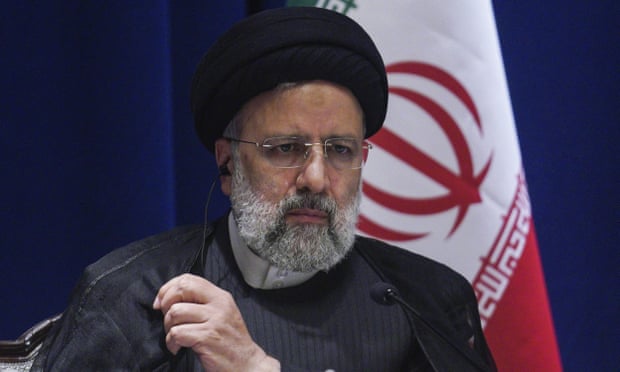Iran’s president said the death of a Kurdish woman who was detained in Iran and sparked widespread protests must be investigated “firmly”, even as he lamented what he claimed was a Western “double standard” on human rights.
Ibrahim Raisi told a news conference on the sidelines of the UN General Assembly in New York that Massa Amini’s death “must be investigated” in the custody of Iran’s ethics police.
“I contacted her family immediately, and I assured them that we will continue to investigate this incident with determination…Our primary concern is to uphold the rights of every citizen.”
Regarding Amini’s death, he said the authorities were doing what they needed to do and that responsibility now fell to the judiciary. He claimed the original coroner’s inquest into Amini’s death showed she died of heart failure or a stroke, not a physical beating by the ethics police.
But he said: “If her death was due to negligence, it would definitely be investigated, and I promise to follow up on the matter whether or not the international forum says it.”
Protesters rejected the state’s conclusion, pointing to reports that police beat Amini with batons in the head and slammed her head into one of their vehicles.
Rights groups fear at least 36 people have been killed in six days of protests sparked by the Sept. 16 death of a 22-year-old Kurdish woman.
Protesters set fire to police stations and vehicles in several cities on Thursday, while Iran shut down internet in Tehran and parts of Kurdistan and blocked access to platforms such as Instagram and WhatsApp in an attempt to curb the growing protest movement. Iranian women take to the streets and go online to burn hijabs and cut their hair.
Amini was detained on suspicion of wearing a headscarf in an “inappropriate” manner. Activists said the woman, whose Kurdish name was Jhina, suffered a fatal blow to the head, a claim officials denied and an investigation was announced. Police continue to insist she died of natural causes, but her family suspects she was beaten and tortured.

Raisi, a former hardline head of the judiciary accused of sending hundreds to death in the past, said Iran would not tolerate “chaotic behavior,” referring to six nights of protests over her killing, but said he countries have accepted legitimate protests.
The judiciary has ordered courts to take a hard line against protesters, claiming the protests are now led by foreign agents and instigated by anti-Iranian social media, a familiar regime charge when dissent erupted.
He tried to turn the tide in the country he was visiting by asking about US police shootings. “Have all these deaths been investigated?” he asked.
He added: “Every day, in different countries, including the United States, we see men and women killed in police encounters without being sensitive to why and how this violence is handled.”
The scale of Iran’s ongoing unrest, the worst in years, remains unclear as protesters in more than 12 cities – venting anger over social repression and the country’s growing crisis – continue to encounter security and paramilitary forces. Iran’s military said on Friday it would “confront the enemy” to ensure safety, in its harshest warning yet to protesters.
Lacey, who formally addressed the assembly on Wednesday, said bad things had happened to people in the hands of authorities everywhere, with vague references to the United States and the United Kingdom. He called for “the same standards” around the world when dealing with such deaths at the hands of authorities.
Raisi’s comparison reflects a common practice among Iranian leaders, who, when faced with allegations of human rights abuses, tend to point to Western societies and their “hegemony” and hold those countries equally accountable.
The protests have grown into an open challenge to the government, with some Iranians calling for the overthrow of the Islamic Republic itself. It was the worst demonstration since 2019, when protests erupted over the government’s hike in gasoline prices.
While not outright condemning the protests, Lacey said: “What’s happening, there are demonstrations…of course these are normal and perfectly acceptable…we have to distinguish between demonstrators and vandalism Behaviour. Demonstrations are good for expressing specific issues.”
The United States on Thursday imposed sanctions on the leaders of the ethics police and other Iranian security agencies, saying they “regularly use violence to suppress peaceful protesters.” U.S. officials have pledged to take further steps in the coming days.
Amini’s cousin, Erfan Mortezaei, told IranWire that the deceased’s family was still under pressure to publicly support the regime’s version of events: that she died not from a head injury in custody, but from complications from a historic brain surgery.
Martha’s nephew, 17-year-old Alkan, was detained over the weekend. He was released yesterday morning on 500 million toman ($16,000) bail. The justice department told the family it was because he went to the office of a news organization in the city, presumably to talk to them about his aunt.
“The purpose of this pressure,” Erfan said, “is to stop nationwide protests and get a mandatory statement from Massa’s family.”
Nasser Kanani, a spokesman for the Islamic Republic of Iran’s foreign ministry, wrote in a tweet without mentioning the nationwide protests in Iran: “True human rights violators do not have the necessary moral competence to comment on human rights. .”
In the riot scale index, Tehran Mayor Alireza Zakani claimed that 43 buses, 54 bus stops and 23 fire engines were damaged.
The protests had no organized leadership, and while the initial focus was on women’s rights not to wear headscarves in public or to be harassed by the moral police, there were broader calls for freedom or the overthrow of the regime.
Iranian officials have been trying to undermine popular support for the protests by highlighting their anti-Iranian violence.
The US-based human rights group has been trying to issue writs against Raisi on behalf of former political prisoners, including dual Anglo-Australian national Kylie Moore-Gilbert, who was held for two years.